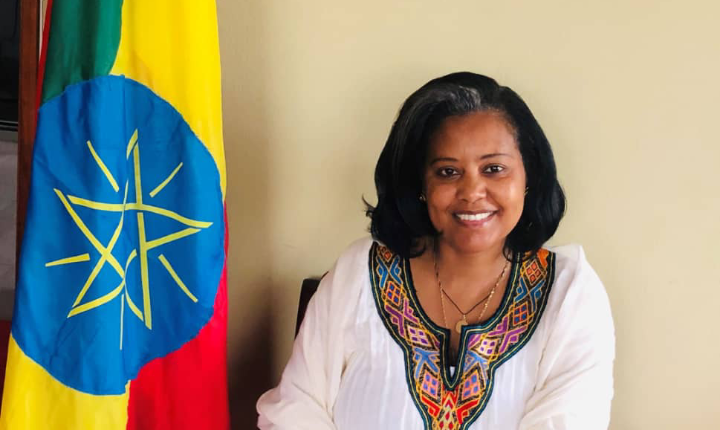Ethiopia’s ambassador to Uganda, H.E Alemtsehay Meseret, has told Sudan and Egypt not to undermine the role being played by the continental body, African Union (AU), in resolving the existing standoff over the Grand Ethiopian Renaissance Dam (GERD).
The giant hydropower dam on the Blue Nile built by Ethiopia, when completed will become Africa’s largest hydroelectric power generator and the world’s seventh-largest dam. The project has however turned out to be the major cause of a diplomatic standoff between Ethiopia and the two nations for nearly 10 years.
Ethiopia has started holding back the water flow to fill the reservoir behind the dam for a second year but Egypt has regarded the project as an existential threat to its water supplies. It is pushing Ethiopia to fill the reservoir over a longer period if needed and guarantee minimum flows.
Sudan on the other hand is concerned about the safety and effect of the dam on its own dams and power stations. It is calling for information sharing by Ethiopia on the same.
Talks to resolve the matter facilitated by Washington hit a dead end last year and efforts to relaunch them by the African Union in Kinsasha early this year did not succeed, prompting Sudan and Egypt to call-on the United States, the European Union and the United Nations to mediate directly.
The two nations have reportedly mobilized the League of the Arab States to take the GERD issue to the UN Peace and Security Council, something Ethiopia says would “unnecessarily internationalize and securitize” the matter.
Speaking to journalists in Kampala, ambassador Alemtsehay said that there is no need for the two countries to involve the international community in the matter that the African Union is ably and competently handling.
She said the trilateral negotiation on the GERD is conducted with Ethiopia’s initiative and that Ethiopia is fully committed to continue the negotiation in good faith to reach a mutually acceptable win-win outcome.
She revealed that Ethiopia welcomed the involvement of the African Union to resolve the existing differences since it supports the notion ‘African solutions for African Problems’.
“It is an opportunity for the three countries to strengthen the Union and show the world that Africans can solve their problems by themselves. To the Contrary and against the wish of Africans, both Egypt and Sudan relentlessly campaigned to take the issue away from the African Union in the midst of its efforts,” ambassador Alemtsehay said.
“For Ethiopia, this approach of undermining the African Union is unacceptable. Ethiopia strongly believes that the AU is capable of facilitating the negotiations and brings the process to a successful outcome”
“In the last one year, the trilateral negotiation under the auspices of the African Union has offered the three countries to better understand each other’s concerns and address some of the outstanding issues,” she added.
The ambassador says “internationalization and securitization of the Dam will not help the three countries to reach to a win-win solution.”
On Thursday while deliberating at the UN security council, Ethiopia further expressed that the Security council is not the right place to discuss a hydropower project and requested the council to return the matter to the AU platform and allow the three counties to negotiate in a good faith principle.
The ambassador says the GERD is purely a development project and also a source of cooperation to the Nile riparian countries which should instead be supported not pulled down.
“It is a symbol of equitable and reasonable utilization and common aspirations of the riparian countries to utilize their common resource,” she says.
Ethiopia generates 77 billion meter cube of water per year which is 86% of the water contribution of the Nile and thus according to ambassador Alemtsehay, the country’s plans to impound the river with a “small fraction” of the annual inflow should not have been contested.
Water Experts of the three countries agreed a stage-based filling of the GERD, which Ethiopia subscribed to. The country fills the Dam per the Declaration of Principles agreement signed by the three countries in 2015.
The Dam’s second year filling happens as scheduled in the months of July and August this year.








